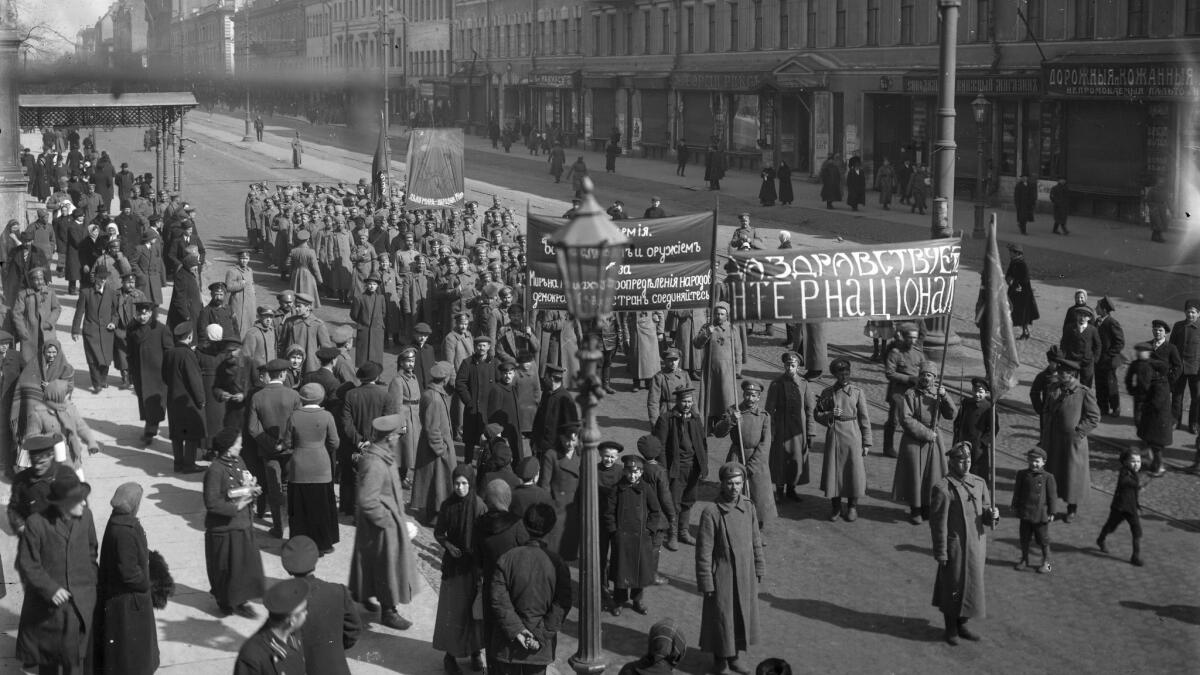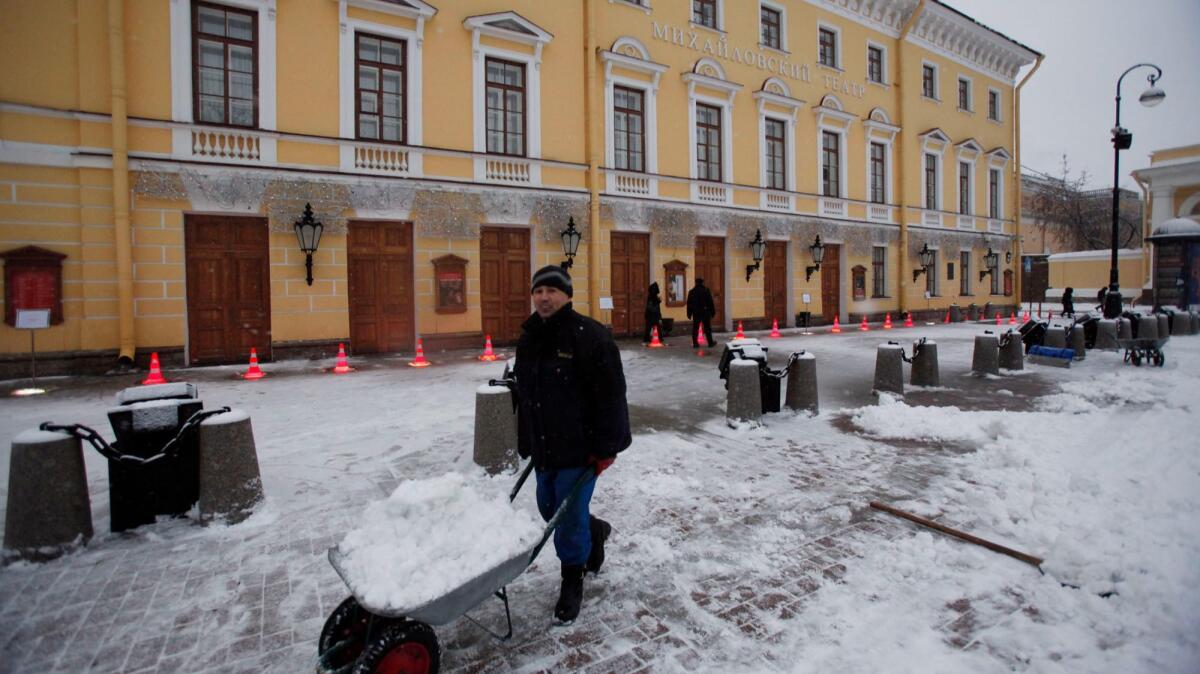Janet Fitch explains what it took to go back to Russia 100 years ago in ‘The Revolution of Marina M.’
My new novel debuts on the 100th anniversary of the Russian Revolution, which is also the historical moment of the book. It didn’t take me quite 100 years to write “The Revolution of Marina M.,” but 11 years was long enough.
Unlike my last books, “White Oleander” and “Paint It Black,” set in the ’90s and the ’80s in Los Angeles, I didn’t live through the Russian Revolution. I couldn’t call its subjects and ask, “How did your telephone work in 1917? Could you walk from car to car on a train, or did you have to exit the car and walk back? How easy was it to join the Bolshevik party?”
I did my best. I read hundreds of books — histories, biographies, memoirs. I’m grateful to the libraries at USC, where as an adjunct professor I could borrow books for a semester at a time. As a novelist, my imagination springs from the concrete details, and the writing is only as vivid as my mastery of the time and the place. Russia is foreign enough, but the past too is a country, and it cannot be visited in the flesh.
I once spoke with an eminent historian whose books on the revolution sit at my right hand. Surely, he could clear up some unsolved mysteries — after all, he’d spent his career writing about this period. But he confessed that the kind of detail I was searching for was exactly what the historian clears away to get at the information he considers valuable. Then I understood that a novelist’s meat is a historian’s clutter.
A historian wants to be “in the room where it happens.”

I just saw “Hamilton” at the Pantages Theatre, and Aaron Burr’s song seems particularly appropriate. He wants to be in the room where things happen, where the decisions are made.
I’ve been thinking a lot about history and the novel, the difference between making history and living in history.
In Lin-Manuel Miranda’s musical, the viewer is made privy to the machinations of power. It subtly offers the comfort and importance of being in the room, the luxury of identifying with the people who make history. It makes us feel more powerful by proximity.
But what about the people who aren’t in the room, who are never in the room?
The poignant truth of human experience is that most of us aren’t in the room. We’re not the hammer, but the anvil.
Yet this is not only our tragedy, I believe it’s also our heroism, our human dignity, our slice of freedom before the compulsion of fate.
Pasternak’s Yuri Zhivago was no politician. In “The Power and the Glory,” Graham Greene’s whiskey priest makes a personal response within a violent historical moment. Their struggles may seem insignificant compared to those of the great players of history. But human life lived with boldness and dignity under the pressure of large historical events to my mind can make a more compelling story, profound, rife with meaning.
How does one person suffer and dream and struggle to make sense of her life in a time of extraordinary change?
My book follows a young woman, Marina Makarova — daughter of privilege, a bright, idealistic girl, a poet — as she comes of age within the matrix of the Russian Revolution. She’s no Alexander Hamilton, or Lenin shaping his epoch, yet hers is a story of vital importance: How does one person suffer and dream and struggle to make sense of her life in a time of extraordinary change, the machinery of which is far beyond her control?
To tell my story, I have to know how it felt to stand in lines at the district soviet trying to get papers one needed to work, and listening to rumors of what was said in those rooms. Hungry, ill-clothed, hopeful, stressed out. That’s the room I want to be in. Not how people shape history, but how history shapes us, how it distorts our stories, what it calls upon us to do. Who we become under its pressure.
I scoured histories, memoirs, biographies for tangible detail, spoke with historians and translators. Yes, I had to be secure in the political framework but, more importantly, I had to be armed to re-create the texture of revolutionary life. It had to feel real. My novelist’s imagination requires stairs and hallways, broken pipes, outbreaks of cholera, tea and hats, shootings in the basement, love affairs, the terror and hope that was the daily bread of the revolution.
Women’s memoirs offered the most valuable details. The women didn’t feel it was beneath them to mention such things as laundry and sanitation, encounters with the unemployed and with soldiers, grinding fear and brutal cold. Everyone lived from rumor to rumor, reading between the lines of official news, seizing on any scrap of information. I understand that better today than I did when I started the book, ten years ago.

I needed to go back to Russia, to St. Petersburg. I needed to sniff the wind, touch the stones of the embankments once more. I’d been a student in Leningrad in summer 1977, enrolled in a summer language program at the Leningrad Polytechnic Institute. My idea of Russia had been formed by literature and films, Dostoyevsky and Tolstoy, Tarkovsky and David Lean. Soviet reality proved a rude awakening — the crumbling condition of the city, the poor quality of the food, the empty stores. But I would never forget those Soviet smells and sounds, the peculiar white skies, the nights of vodka and harsh cigarettes and cheap guitars, the kindness and brusqueness of the people, their humor, their stoicism — a unique blend out of which I began to assemble a more nuanced sense of the people and Russian life.
I remember too, they told me: “We are not ourselves in the summertime. If you want to know us, come back in winter.”
So 30 years later, I returned to that city, now St. Petersburg. It was January. I stood on the Lieutenant Schmidt Bridge over the Neva, leaning on the railing with its iron seahorses, gazing out at the river’s rough ice in the low winter light where I’d stood so long ago. Much had changed since I had last walked there, but now I was Marina. It was with her hand that I took notes in the frozen half-light. It was as her that I walked the canals and entered the courtyards where so much of the city’s hidden life takes place. I was getting my Russian eyes back.
Russia is foreign enough, but the past too is a country, and it cannot be visited in the flesh.
Then, in 2009, lightning struck. I was awarded a Likhachev Foundation cultural fellowship, specifically designed to help Americans researching Russian projects in St. Petersburg. On my last trip, I’d walked down foggy streets and gazed up at windows. This time, I entered the building — on a red carpet.
At the State Museum of Political History of Russia, not one but two curators fielded a multitude of questions about revolutionary life in the city. I saw photographs of black market speculators poised between train cars with enormous bags of illegal food, and shots of mass demonstrations — I was sure if I looked hard enough, I would see Marina staring back at me. Life and art were merging in the most dizzying way.
In the Museum of the History of St. Petersburg I saw objects I’d read about for years: all-important ration cards for bread and fuel and galoshes. Precious labor books that meant the difference between subsistence and starvation, complete with their motto, “He who does not work, does not eat.”
I did a signing in the 24-hour bookstore on Ploshchad Vosstaniya, Insurrection Square, once Znamenskaya — the very site of the massacre witnessed by Marina that was the turning point in the February Revolution.
At the Anna Akhmatova Museum, that sacred place which houses the apartment where the poet lived with her husband, his ex-wife and his family, I joined the director and her colleagues. They began the interview by asking me to describe my book.
Within minutes, they were telling me about Marina, arguing about which young poet she reminded them of, where she lived, her family life, her school. They spoke as if they already knew her.
And in that moment, I saw that the character I had created was an actual person. She had a concrete reality that these knowledgeable people could see and feel. It reminded me of visiting the set of a movie based on a novel I’d written, the excitement of being able to walk inside something that had only existed in my head.
That day, I knew I was writing a novel that someone could walk into and take a seat. I was in the room.
Fitch is the author of the new novel “The Revolution of Marina M.,” as well as “White Oleander” and “Paint It Black,” which have both been adapted as films.
More to Read
Sign up for our Book Club newsletter
Get the latest news, events and more from the Los Angeles Times Book Club, and help us get L.A. reading and talking.
You may occasionally receive promotional content from the Los Angeles Times.






